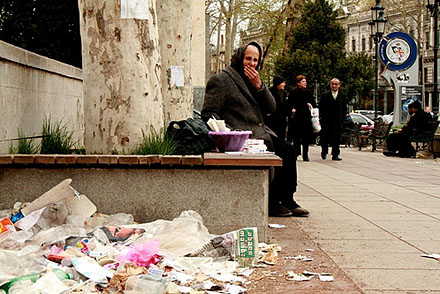
Numbers Declining, Risks Mounting in Tbilisi Demonstrations
Publication: Eurasia Daily Monitor Volume: 6 Issue: 81
By:

As crowds dwindle to near-insignificance at the Tbilisi protest rallies, their leaders are abandoning the failed tactics of mass mobilization, shifting to new efforts designed to spark violence and blame it on the authorities. The daily protest rallies outside the Parliament building since April 9 have seen the attendance declining from tens of thousands during the first days, down to a level of 1,000 to 5,000 from April 21 to date (AFP, AP, April 21 – 27).
All three national television channels continue covering the rallies, and the leaders’ other activities and pronouncements, in punctilious detail, even as the same leaders complain on TV screens that they are being deprived of freedom of speech (Rustavi-2 TV, Imedi TV, Public TV, April 21-27).
The radical opposition has no program or policy proposals, other than removing President Mikheil Saakashvili and the government -a goal dating back to 2007. "Regime change," however, would be a misnomer, since the extra-parliamentary opposition includes at least 13 parties and blocs -some of these consisting of several parties each- under almost as many leaders with their personal agendas and ambitions.
To a large extent, the radical politicians’ tactics were always predicated on achieving victimhood status in the eyes of the populace, locally accredited Western missions, and international public opinion. The authorities have avoided that trap thus far by allowing the demonstrators total freedom of movement and avoiding any direct contact in the streets between the authorities and demonstrators. For their part, radical leaders and some of their hardened followers are inching toward the brink of violence, expecting to drag the government with them beyond that brink.
Those tactics could either provoke the police into responding to blatant lawlessness or involve ordinary residents, irate at the disruption of life within the city, to clash with protesters, forcing the authorities to intervene and resulting in a general melee. Furthermore, the radicals’ tactics are designed to demonstrate that the presidency and parliament can no longer function under permanent siege by diehard protesters. This situation could at some point compel the authorities to re-establish the legal order in downtown Tbilisi, or else allow the state to be perceived as surrendering to anarchy.
Mundane as it may seem, the issue of sanitation is one fraught with the risk of violence. Garbage overwhelms the picketing sites and other parts of Tbilisi, where protesters have blocked traffic. Tbilisi City Hall is unable to collect the refuse for fear of provoking clashes with demonstrators (one such attempt by the sanitation service almost spark a clash). As the weather grows warmer, the problem and the risks are bound to grow more acute.
Such are the dilemmas that the radical groups are posing to the authorities. On April 23, speakers at a rally announced a shift to the "strategy of barricades." Orators there boasted -correctly, and to cheers- that the action had forced the parliament to suspend or relocate its meetings (EurasiaNet, April 23).
On April 24, TV footage including that aired by pro-opposition channels showed sticks being distributed to some protesters, who claimed that they needed sticks to defend themselves (AP, April 24). That same day, referring to the authorities habitually as "criminals," opposition standard-bearer Levan Gachechiladze (2008 presidential election runner-up) told the rally, "This will be a small bloodshed between criminals and the Georgian people." He also threatened (on Public TV) to give the channel’s chairman "a slap in the face whenever I meet him" (Public TV, April 24).
During the night of April 24-25 outside the Marjanishvili theater, picket participants attempted to break through the police escort to President Saakashvili’s car. One policeman was hospitalized with injuries after the scuffle. One opposition leader at the scene, Giorgi Khaindrava, energized those protesters by shouting into a megaphone at the president, "You rabbit, you coward !" This slogan, standard by now at these rallies, is meant to suggest that Saakashvili displayed weakness toward Russia during the August 2008 war.
On April 26, orators at the rally announced a strategy of "hunting for the President" (AP, April 26). This implies haunting Saakashvili wherever he goes in Tbilisi, so as to prevent him from appearing at public events in the city. Protest leaders believe that the president may desist from making appearances, rather than risk violent incidents.
On April 27, a youth group led by Anzor Bitsadze staged a rowdy "corridor of shame" at the entrance to the Public TV building, insulting and threatening editorial staff (Public TV, April 27). Anzor Bitsadze is the grandson of Anzor Burjanadze and son of Nino Burjanadze and Badri Bitsadze, who have joined the radical opposition.
Badri Bitsadze, former head of the border police, is one of the few opposition leaders who could supply a modicum of organization and funding to the movement. His current billing is that of head of a "Border Security and Migration Research Center." Apparently hoping to attract some of his former employees to join him, Bitsadze claims that the authorities persecute some employees and veterans of border police (Imedi TV, April 23).
As this move suggests, the emergence of unauthorized groups to "keep order" is a growing risk. One such group, "Together," proposes to carry out 24-hour patrols in Tbilisi. While another, "Peace in the City," led by former defense minister Gia Karkarashvili, would "protect peaceful protesters amid incidents of violence against opposition activists" (Rezonansi, April 21).
In a variation on the familiar "tent city" tactics, the demonstrators have installed several "cities of prison cells" around the Parliament and State Chancellery buildings. The mock cells (some inhabited by demonstrators and some empty) are meant to convey the message that Georgia as a country is a prison. Although Georgia does not have political prisoners by any internationally accepted definition of the term, the mock cells are supposed to supply at least an image of repression in the radical opposition’s world of fantasy.




